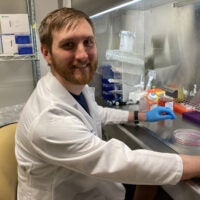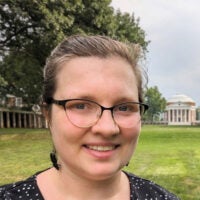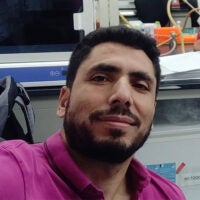The UVA Comprehensive Cancer Center is home to cutting-edge research with labs studying a vast array of disease models that move the field with their translationally significant work. This year, seven graduate students and three post-docs were awarded the Cancer Center Trainee Fellowship. The awardees were chosen from a competitive pool of applicants for their innovative proposals.

Salma Sharmin is a graduate student in the Kashatus Lab studying how the GTPase, Dynamin-related protein 1 (DRP1), regulates mitochondrial fission and the subsequent impact on resistance of pancreatic tumor cells to the kinase inhibitor, trametinib. Regulation of mitochondrial dynamics, through DRP1, plays an important role in tumor progression, especially in RAS driven cancers. She generated pancreatic cells that were resistant to trametinib and interestingly found that DRP1S616 phosphorylation is upregulated in resistant cells and, targeting DRP1 re-sensitized these cells to the drug. With this fellowship, she will examine the mitochondrial morphology in these resistant cells. Additionally, she will perform a CRISPR screen, with a focus on kinases, in the resistant cells to identify novel pathways specific to resistance mechanisms to broaden the understanding of these cells. Salma relayed that her dedication to cancer research is driven by a desire to understand the complexities of cancer cell signaling mechanisms.

Chris Prevost, also a graduate student in the Kashatus Lab, studies how cancer cell stress influences lipid droplet dynamics and how these lipid droplets originating due to the cell stress response impact the pathophysiology of cancer. Lipid droplets are part of an emerging field in cancer biology and it has been observed that dysregulated lipid droplets can promote tumor progression. Starting with a molecular approach, his project will be exploring how the transcription factor Nuclear factor erythroid 2-related factor 2 (NRF2) regulates lipid droplets and the impacts these lipid droplets have in cancer biology. The activity of NRF2 is found to be promoted in many cancers as it is a crucial regulator of cellular response to oxidative stress. Together, his project aims to determine how NRF2 and lipid droplets contribute to the pathophysiology of cancers in the harsh tumor microenvironment.

Lydia Petricca is a graduate student in the Bullock and Price Labs. Lydia aims to explore how focused ultrasound (FUS), a non-invasive and non-ionizing therapy, can be used to exploit adaptive, immunological responses against solid tumors. Specifically, her studies are aimed at exploring immunological effects of boiling histotripsy – a mechanical form of FUS that does not result in thermal accumulation within the treated tumor tissue – and its impact on tumor antigen acquisition in the draining lymph nodes. Another overall aim is to examine the role of T cells in mediating the efficacy of the combinatorial therapy thermal-FUS and the chemotherapy Gemcitabine in controlling murine triple negative breast cancer.

Niket Yadav is a student in the Medical Scientist Training Program (MSTP) here at UVA who is currently completing his thesis work in the Purow Lab. His thesis work primarily focuses on repurposing drugs currently approved and used clinically for other indications, against glioblastoma (GBM). Ultimately, Niket aims to find an additive or synergistic impact of the combination of these drugs in human GBM cell lines as well as mouse models and define the biochemical effects of these drugs on rewiring the molecular and immune landscapes in GBM. Niket is drawn to neuro-oncology research due to its complexity and uniqueness compared to other forms of cancer and aims to expand its limited repertoire of current applicable therapies.

Katerina Morgaenko is a graduate student in the Pompano Lab. She is currently investigating the interplay between physical remodeling and evolving biochemical factors in the form of structural and functional changes in the tumor draining lymph nodes during metastatic breast cancer.

Roza Przanowska is a postdoctoral researcher in the Janes Lab studying the role of long non-coding RNAs (lncRNAs) in hormone positive breast cancer. Her project will focus on identifying heterogeneously expressed lncRNAs functioning as RNAs, without being translated into proteins, and determine the subsequent pathways these lncRNAs are involved in and characterize their functional importance in tumorigenesis and progression. Upon identification of these lncRNAs, her project will narrow to focus on characterization of the most interesting candidate and will include modeling its secondary structure using experimental data and empirically defining the functional domains by testing specific mutations. Knowledge gained from this project may lead to a new area of research and the identification of novel biomarkers and functional structural domains in lncRNAs that can be therapeutically targeted and will bring the field one step closer to personalized therapies.

Aleksandra Ulman is a postdoctoral researcher in the Jiang Lab. Her project is focused on the transcription factor cMYC, which is found to be hyperactive across various cancers. Despite being a potent oncogenic driver, the unique structural properties of cMYC are thought to make it undruggable. Her project will employ a novel approach using chaperones to dissolve cMYC condensates as a potential therapeutic option. Aleksandra has always been fascinated by cell biology and is curious to understand how diseases are driven by deregulated cellular processes.

Mehraju Lone is a postdoctoral fellow in Dr. Mike Engel’s lab whose research encompasses targeting epigenetic modulators, specifically Lysine Specific Demethylase 1, as a novel potential therapeutic target in acute myeloid leukemia. This enzyme plays a crucial role in hematopoietic cell differentiation which is typically disrupted during the formation, maintenance and progression of cancer. This fascination drives Mehraju to explore the complexities of cellular processes gone awry, not only to advance scientific knowledge but to ultimately contribute to the development of innovative strategies to combat cancer and improve the lives of those affected by these challenging diseases. He is motivated by the potential to translate these insights into meaningful advancements in cancer treatment, potentially offering hope to individuals and families affected by these conditions.
Additional graduate students who were awarded this fellowship are Karl Kowalewski studying under Matt Lazzara, PhD, in the Chemical Engineering Department and Cam Nguyen researching under Krishni Wijesoorlya, PhD, in the Physics Department.
Congratulations to all of the trainees awarded this fellowship! BIMS students may contact Kendall Bromley and Nicole Kirk to get recognized for your accomplishments.
Filed Under: Education, Honors & Awards
